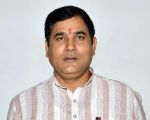Delhi : In the bustling heart of Indian media, where voices vie for attention and stories shape the nation’s consciousness, Deepak Chaurasia carved a niche that was uniquely his own. Born on December 28, 1968, in the vibrant city of Indore, Madhya Pradesh, Deepak’s journey from a small-town dreamer to a towering figure in Indian television journalism is a testament to grit, resilience, and an unwavering commitment to truth. Today, as we reflect on his life and legacy, we honor a man whose struggles, triumphs, and unrelenting spirit left an indelible mark on the landscape of Indian media.
Deepak’s story begins in the modest lanes of Indore, where his early years were shaped by the simplicity and tenacity of middle-class India. Growing up in Sendhwa, a small town in Madhya Pradesh’s Barwani district, he was nurtured by a community that valued education and hard work. From a young age, Deepak displayed a curiosity about the world, a trait that would later define his journalistic career. His decision to pursue journalism was not a fleeting whim but a calling that took root in his teenage years, as he later shared, recalling his resolve to become a journalist by the time he was in the 10th grade. This clarity of purpose set him on a path that would lead him to the hallowed halls of the Indian Institute of Mass Communication (IIMC) in New Delhi, where he honed his craft and earned a diploma in journalism.
The journey to Delhi was not merely a geographical shift but a leap into a world of opportunity and challenge. In the early 1990s, Indian journalism was undergoing a transformation, with the advent of private television channels reshaping how news was consumed. Deepak arrived in this dynamic environment with little more than his education and a fierce determination to succeed. His first foray into the field was with the newspaper Sanjha Lokswami in 1993, where he cut his teeth as a reporter covering stories that demanded both courage and precision. His early assignments included reporting on the exodus of Kashmiri Hindus from the Kashmir Valley, a tumultuous chapter in India’s history that tested his ability to navigate complex narratives with sensitivity and insight.
Deepak’s career took a significant leap when he co-founded Aaj Tak in 1995, a pioneering 24-hour Hindi news channel that would redefine Indian television journalism. As one of the foundational pillars of the channel, he played a pivotal role in shaping its identity as a platform for hard-hitting, accessible news. His work at Aaj Tak was marked by a relentless pursuit of stories that mattered, from political upheavals to social issues. Over the years, Deepak’s career saw him navigate a series of high-profile roles, including stints at DD News as a consulting editor in 2003, a return to Aaj Tak in 2004, and later positions at STAR News (which became ABP News), India News, News Nation, and Zee News. Each transition was a chapter in a career defined by adaptability and an unyielding drive to remain at the forefront of the industry.
Yet, Deepak’s journey was not without its struggles. The path of a journalist in India is fraught with challenges—political pressures, ethical dilemmas, and the constant scrutiny of public opinion. Deepak faced these head-on, often at great personal cost. His bold reporting style, characterized by incisive commentary and fearless sting operations, earned him both admirers and critics. In 2013, a Media Sarkar sting operation aired under his watch at India News, alleging financial impropriety by leaders of the Aam Aadmi Party. The operation sparked controversy, with accusations of fabrication and defamation, thrusting Deepak into the eye of a legal and public storm. Similarly, his coverage of the Asaram Bapu sexual assault case in 2013 led to criminal charges and arrest warrants, including a 2023 Haryana court order tied to a POCSO case. These incidents, while contentious, underscored Deepak’s willingness to tackle powerful figures and contentious issues, even when it invited backlash.
Perhaps the most public of his struggles came in 2021, when Deepak faced widespread criticism for his on-air demeanor while reporting the tragic death of General Bipin Rawat in a helicopter crash. Social media erupted with accusations of inebriation as he slurred words and made factual errors, referring to the general as a “journalist” and “General V.P. Singh.” The incident was a low point, drawing harsh scrutiny and leading to his abrupt removal from the broadcast. Yet, Deepak’s response—denying intoxication and attributing his condition to painkillers for a leg injury—revealed a man grappling with personal challenges under the unrelenting glare of public judgment. His resilience in the face of such criticism, coupled with his determination to continue his career, spoke to the depth of his character.
Beyond the controversies, Deepak’s contributions to journalism were profound. His coverage of major events, including the 9/11 attacks, the 2004 Tsunami, and the 2008 Mumbai terror attacks, showcased his ability to report from the frontlines with clarity and compassion. His show, Tonight with Deepak Chaurasia, became a platform for robust debates, bringing critical issues to the forefront of public discourse. His work earned him recognition as one of the most influential Hindi-language journalists, a reputation bolstered by his ability to connect with audiences through his authoritative yet relatable style.
In 2024, Deepak ventured into uncharted territory by joining Bigg Boss OTT Season 3, a move that surprised many but reflected his willingness to embrace new challenges. His participation in the reality show was not merely a career pivot but an opportunity to reveal a different facet of his personality to a younger audience. Promising to share “uncensored” stories from his journalistic career, he brought his trademark candor to the Bigg Boss house, captivating viewers with insights into the media world. Though evicted after 30 days, his stint underscored his versatility and fearless approach to reinvention.
Deepak’s personal life, though less documented, was anchored by his family. Married to Anasuya Roy, he was a devoted husband and father to his children, balancing the demands of a high-profile career with the quiet joys of family life in New Delhi. His net worth, estimated at Rs. 21.5 million, was a reflection of his success, but it was his passion for journalism that truly defined him.
As we bid farewell to Deepak Chaurasia, we celebrate a journalist who dared to ask tough questions, who weathered storms with resilience, and who never shied away from the truth, even when it came at a cost. His struggles, often overshadowed by his public persona, were the crucible in which his legacy was forged. From the streets of Indore to the studios of Delhi, Deepak’s voice resonated with millions, reminding us that journalism, at its core, is about courage, conviction, and the relentless pursuit of stories that shape our world. His light may have dimmed, but the echo of his work will continue to inspire generations of journalists to come. Rest in peace, Deepak—you were, and always will be, a true titan of Indian journalism.





